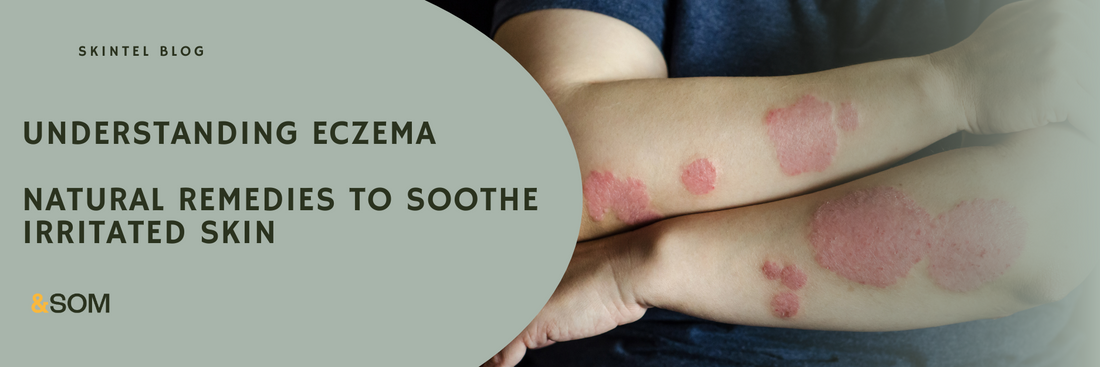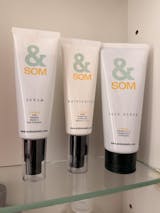
Natural Remedies for Eczema
Whatever you do, DO NOT use bleach to soothe Eczema irritations!
You may think it's weird for me to say that. However, while doom-scrolling on Instagram as you do, I came across a board-certified dermatologist saying that bathing in water with bleach added is great for soothing irritated Eczema. I’m not here to tell you if it works or not; I’m here to tell you that you have other (natural) options.
For those who aren't familiar with me, I’m the founder of a skincare range tailored specifically for men and made with ingredients that 100% come from natural sources. I dedicated three years of my life to researching the ins and outs of skincare, so I feel it my duty to share with you everything I have learned along the way. My goal is to help you make better-educated decisions when it comes to your health.
What is Eczema?
Eczema, or atopic dermatitis, is a chronic skin condition characterised by inflamed, itchy, and red skin. It affects millions worldwide, with symptoms ranging from mild irritation to severe, persistent discomfort. It can affect anyone, from babies to adults. You can be born with it or develop it later in life. Understanding the causes of eczema and identifying natural remedies to soothe the skin can help manage the condition effectively.
What Causes Eczema?
Eczema is a complex condition influenced by various factors, including genetics, environmental triggers, and the immune system. It defaults to the skin barrier function. I will break it down below for you as best as I can. As a heads-up, it is a long explanation, but the purpose of this blog is to help those in need.
- Genetic Factors: Studies have shown that a family history of eczema, allergies, or asthma increases the likelihood of developing eczema. The filaggrin gene, which plays a crucial role in skin barrier function, is often mutated in individuals with eczema, leading to a compromised skin barrier.
- Environmental Triggers: Exposure to certain environmental factors such as harsh soaps, detergents (dishes and clothes), allergens, and even stress can trigger eczema flare-ups. Pollutants and climate change are also known contributors. This is why Natural products are so important
- Immune System Response: An overactive immune response can lead to inflammation and irritation in the skin. In people with eczema, the immune system reacts aggressively to irritants, causing chronic inflammation.
- Skin Barrier Dysfunction: A weakened skin barrier allows moisture to escape and irritants to enter, leading to dry and cracked skin. This can be both a cause and effect of eczema, creating a cycle of irritation and inflammation.
Not only are people working harder than they’ve ever had, but fast food and processed foods are also in our cupboards (mainly because they’re cheaper). To deal with the stress, we drink, smoke, vape, and eat, and then top it off by spraying toxic chemicals on our bodies to smell and look good.
What are some natural remedies for eczema?
Don’t worry; I’m here to tell you about some things you can do naturally to help soothe your eczema. Several natural ingredients have been studied for their effectiveness in soothing eczema-prone skin. Here are a few with evidence-backed benefits:
Colloidal oatmeal is a highly effective natural remedy for managing eczema due to its rich composition of moisturizing, anti-inflammatory, and soothing properties.
It contains starches and beta-glucans that lock in moisture and create a protective barrier on the skin, preventing water loss, which is crucial for eczema-prone skin.
The avenanthramides (an antioxidant compound) in oatmeal provide powerful anti-inflammatory and anti-itch benefits, helping to reduce redness, swelling, and the urge to scratch.
Additionally, colloidal oatmeal supports the skin’s barrier function with mild cleansing properties from saponins (a cleansing compound), while its antioxidants protect the skin from oxidative stress. It’s gentle enough for all skin types and can be used in baths to hydrate, soothe, and protect eczema-affected skin.
A study published in the Journal of Drugs in Dermatology (2015) found that colloidal oatmeal has anti-inflammatory and antioxidant properties, making it effective in treating eczema.
2. Aloe Vera:
I used to use this when I was a child. My mum had aloe vera plants all over the house, so if I ever burnt my skin (as children do) out, it came and hand on heart, it went away almost instantly. But here’s a slightly more convincing way of describing it.
Why is Aloe vera highly effective for soothing eczema-prone skin?
Due to its rich composition of active ingredients, It contains polysaccharides (sugar molecules) that retain moisture and form a protective barrier, glycoproteins (sugar and protein molecules) that reduce inflammation, and antioxidants like vitamins A, C, and E that promote skin repair.
Minerals such as zinc offer anti-inflammatory benefits, while enzymes like bradykinase calm itching. Additionally, aloe vera's salicylic acid and saponins provide antibacterial properties, and anthraquinones deliver antimicrobial and pain-relieving effects, making it a comprehensive natural remedy for alleviating eczema symptoms.
How to use it?
Apply the gel (preferably from the plant) directly to the eczema-affected areas. It can be used multiple times daily to provide soothing relief and promote healing.
A study in the Indian Journal of Dermatology (2008) highlighted aloe vera's effectiveness in reducing skin irritation and promoting skin barrier repair, making it beneficial for eczema sufferers (Surjushe et al., 2008).
3. Chamomile Extract:
Chamomile is an incredibly effective natural remedy for soothing eczema due to its powerful anti-inflammatory and calming properties.
It contains vital compounds like bisabolol and apigenin (natural compounds), which help to reduce the redness, swelling, and irritation of eczema by allowing the release of inflammatory chemicals.
The flavonoids in chamomile act as antioxidants, protecting the skin from oxidative stress and free radical damage, which can exacerbate eczema symptoms.
Additionally, chamomile’s ability to decrease histamine release significantly reduces itching, providing much-needed relief. The azulene and matricin in chamomile also promote skin healing and regeneration, helping repair the compromised skin barrier common in eczema.
And the cherry on top of the cake: Chamomile’s mild antimicrobial properties help prevent secondary infections, ensuring that the skin can heal without further complications.
Research published in Molecular Medicine Reports (2010) demonstrated that chamomile extract significantly reduces skin inflammation and can help alleviate symptoms of eczema.
4. Coconut Oil:
Coconut oil is a go-to remedy for eczema because of its exceptional moisturizing and protective qualities. It’s rich in medium-chain fatty acids, particularly lauric acid, which deeply hydrates the skin and strengthens its lipid barrier.
This is crucial for those of us dealing with eczema, as a strong skin barrier helps to lock in moisture and shield the skin from irritants that can trigger flare-ups. The anti-inflammatory effects of lauric acid further help to reduce the redness and swelling associated with eczema, providing soothing relief.
Coconut oil’s natural antimicrobial properties are especially beneficial. They protect the skin from infections, particularly from bacteria like Staphylococcus aureus, which can make eczema worse. Plus, coconut oil is gentle enough for sensitive skin, making it a safe and effective option for regular use in managing eczema symptoms.
A study in Dermatitis (2014) found that virgin coconut oil improves skin hydration and barrier function in patients with eczema.
So, in summary, there are some suitable options for you to choose from that will aid with any flare-ups or irritations. One thing I can guarantee you is that none of the above have warning labels on them for being poisonous or causing severe irritation, unlike bleach!
If you’ve enjoyed this, share your thoughts in the comments section.



